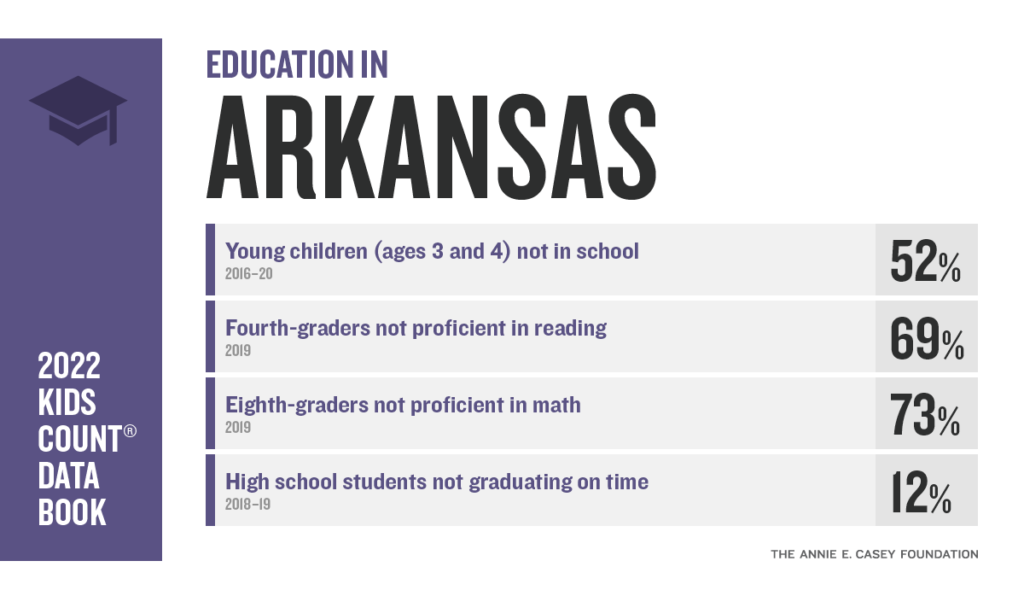
Arkansas’s children reflect who we are as a state. Educating the next generation of Arkansans is one of our greatest responsibilities. Looking at the recently released 2022 KIDS COUNT® Data Book, we can see that Arkansas’s rankings on education are improving on some measures and worsening on others. Based on 2020 data in this year’s report, Arkansas ranked 34th overall on education, up from 35th last year.

A key education indicator in the report is attendance in a pre-k program for 3- and 4-year-old children. More than half of Arkansas’s 3- and 4-year-old children (52 percent) did not attend a pre-K program in 2016-2020 —slightly better than the national average (53 percent). Our rank is 14th on the measure, an improvement from 18th last year; however, Arkansas is only serving 1,000 more 3- and 4-year-olds than we did from 2008-2012.
Arkansas used to be a national leader in access to quality preschool education, but our progress has stalled. One reason for our lack of progress has been flat state funding for the Arkansas Better Chance (ABC) pre-k program for more than a decade ($111-114 million annually since state fiscal year 2008). Meanwhile, many other states have doubled down on investing early and have passed Arkansas by in this area.
But attendance in a pre-k program for 3- and 4-year-old children is only part of the Arkansas early childhood picture. Many families across the state struggle to find any form of affordable infant and toddler care, much less high-quality care. Additionally, we know that the early childhood workforce is still facing high staff turnover, low wages, high levels of food and economic insecurity, and high levels of depression.
Arkansas invests very little state funding in its early childhood workforce. Other than state funding for the ABC program, most early childhood funding in Arkansas comes from the federal level. Arkansas must immediately take steps to maintain and build the quality of and stability of the early childhood education workforce in the larger childcare system. Among the options:
- Take steps to improve the economic security of our early childhood education workforce, such as creating refundable tax credit for early childhood workers (or a state Earned Income Tax Credit (EITC) for all low-income workers). Proposals to create a state tax credit for early childhood workers failed in 2019, and proposals to create a state EITC failed in both 2019 and 2021.
- Increase compensation for early childhood education workers in all government-funded programs serving children from birth to age 5. This compensation must be tied to improving the quality of the workforce. We need to reward workers with higher levels of education and those with more experience in the early childhood workforce.
- Do more to support family childcare programs. These are smaller programs typically run out of a provider’s home. In some areas, especially rural or more isolated areas, larger childcare centers or pre-k programs are not economically feasible, lack flexible care schedules, or are inaccessible due to transportation issues. In these cases, family childcare homes are the only option. These programs have been hit hard by the pandemic.
- Build the birth to age 3 system. Perhaps most importantly, we need to build the state’s system for serving infants and toddlers, a system that receives very little investment at the state level. This is where our efforts can have the biggest bang for the buck.
Why is early childhood education and development so important? Research has long shown that children who receive quality early childhood education are better prepared for K-12 education and beyond. Quality early childhood education promotes early brain development and the social, emotional and cognitive development of young children. That’s why it’s so important to invest early in their learning and development. This is especially important for children living in poverty, who typically have fewer opportunities and resources to promote their development than do children in higher-income families. Quality early childhood education experiences are incredibly important to ensuring children have a strong start in life and can continue to gain ground socially and academically.
But building a solid foundation in the early years is only one piece of the education puzzle. Even when children have access to high-quality early childhood education, the foundation that has been built must be sustained through quality instruction in kindergarten and the later grades.
Reading proficiently by the end of third grade, for example, is a critical predictor of how well a child will perform in the later grades. In the latest Data Book, Arkansas is ranked 41st in the percent of fourth graders who can read proficiently at grade level. And 69 percent of Arkansas’s fourth graders are not reading at grade level, compared to 66 percent nationally.
Another key education indicator is basic math skills and numerical literacy. Eighth-grade math skills — particularly Algebra — are a good predictor of how prepared students are for the rigors of high school and post-secondary learning. On the latest NAEP highlighted in the Data Book, 73 percent of Arkansas’s eighth graders scored below proficient in math, compared to 67 percent nationally. Arkansas is ranked 43rd in the nation on this measure.
While these statistics are troubling on their own, there are major gaps in these outcomes for Black, Indigenous and other People of Color (BIPOC) students, low-income children, and students with disabilities. To close gaps in outcomes, we must target solutions to close equity gaps in resources and opportunities. The ability of these students to succeed in the later grades after building a solid early childhood foundation depends on a number of factors, such as adequately funding schools and having high-quality teachers, curriculum and methods of instruction, etc.
One issue that is often overlooked in discussions of success in the later grades is school discipline reform. Too many schools still rely on exclusionary disciplinary practices, such as expulsions, out-of-school suspensions, and moving the student to an alternative learning environment (ALE), which disproportionately impact BIPOC students and students with disabilities. We must do better at keeping kids in class and in school and keeping them out of the juvenile justice system and the school-to-prison pipeline. This means relying less on exclusionary measures and continuing to expand on approaches such as Positive Behavioral Interventions and Supports and restorative justice, while also providing educators with trauma-informed response professional development, which are all more effective in addressing school discipline issues.
Finally, education in Arkansas must deal with the effects of the COVID-19 pandemic on our children’s mental health. The data shows that 14% of children in Arkansas are reporting symptoms of anxiety or depression, a 67% increase from 2016 and the third highest increase of all states. A student’s mental health comes with them to school and impacts their ability to be an active participant in their education. This crisis ought to be a part of every discussion had by policymakers that concerns the health and education of our children.
